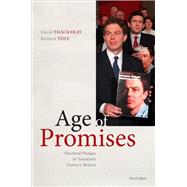- ISBN: 9780198843030 | 0198843038
- Cover: Hardcover
- Copyright: 5/25/2021
Age of Promises explores the issue of electoral promises in twentieth century Britain - how they were made, how they were understood, and how they evolved across time - through a study of general election manifestos and election addresses. The authors argue that a history of the act of making promises - which is central to the political process, but which has not been sufficiently analysed - illuminates the development of political communication and democratic representation. The twentieth century saw a broad shift away from politics viewed as a discursive process whereby, at elections, it was enough to set out broad principles, with detailed policymaking to follow once in office following reflection and discussion. Over the first part of the century parties increasingly felt required to compile lists of specific policies to offer to voters, which they were then considered to have an obligation to carry out come what may. From 1945 onwards, moreover, there was even more focus on detailed, costed, pledges. We live in an age of growing uncertainty over the authority and status of political promises. In the wake of the 2016 EU referendum controversy erupted over parliamentary sovereignty. Should 'the will of the people' as manifested in the referendum result be supreme, or did MPs owe a primary responsibility to their constituents and/or to the party manifestos on which they had been elected? Age of Promises demonstrates that these debates build on a long history of differing understandings about what status of manifestos and addresses should have in shaping the actions of government.






